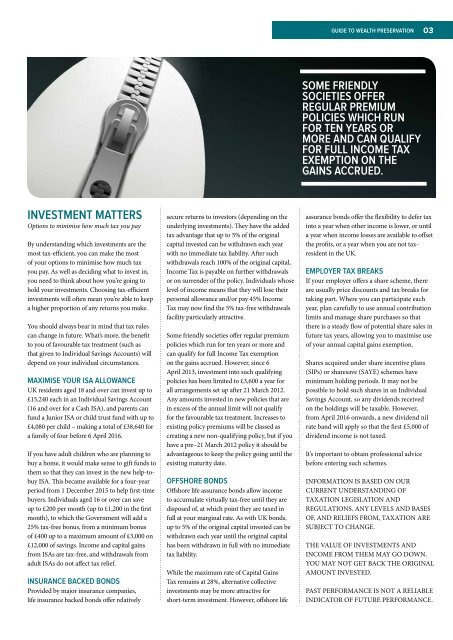wealthguide
You also want an ePaper? Increase the reach of your titles
YUMPU automatically turns print PDFs into web optimized ePapers that Google loves.
GUIDE TO WEALTH PRESERVATION 03<br />
SOME FRIENDLY<br />
SOCIETIES OFFER<br />
REGULAR PREMIUM<br />
POLICIES WHICH RUN<br />
FOR TEN YEARS OR<br />
MORE AND CAN QUALIFY<br />
FOR FULL INCOME TAX<br />
EXEMPTION ON THE<br />
GAINS ACCRUED.<br />
INVESTMENT MATTERS<br />
Options to minimise how much tax you pay<br />
By understanding which investments are the<br />
most tax-efficient, you can make the most<br />
of your options to minimise how much tax<br />
you pay. As well as deciding what to invest in,<br />
you need to think about how you’re going to<br />
hold your investments. Choosing tax-efficient<br />
investments will often mean you’re able to keep<br />
a higher proportion of any returns you make.<br />
You should always bear in mind that tax rules<br />
can change in future. What’s more, the benefit<br />
to you of favourable tax treatment (such as<br />
that given to Individual Savings Accounts) will<br />
depend on your individual circumstances.<br />
MAXIMISE YOUR ISA ALLOWANCE<br />
UK residents aged 18 and over can invest up to<br />
£15,240 each in an Individual Savings Account<br />
(16 and over for a Cash ISA), and parents can<br />
fund a Junior ISA or child trust fund with up to<br />
£4,080 per child – making a total of £38,640 for<br />
a family of four before 6 April 2016.<br />
If you have adult children who are planning to<br />
buy a home, it would make sense to gift funds to<br />
them so that they can invest in the new help-tobuy<br />
ISA. This became available for a four-year<br />
period from 1 December 2015 to help first-time<br />
buyers. Individuals aged 16 or over can save<br />
up to £200 per month (up to £1,200 in the first<br />
month), to which the Government will add a<br />
25% tax-free bonus, from a minimum bonus<br />
of £400 up to a maximum amount of £3,000 on<br />
£12,000 of savings. Income and capital gains<br />
from ISAs are tax-free, and withdrawals from<br />
adult ISAs do not affect tax relief.<br />
INSURANCE BACKED BONDS<br />
Provided by major insurance companies,<br />
life insurance backed bonds offer relatively<br />
secure returns to investors (depending on the<br />
underlying investments). They have the added<br />
tax advantage that up to 5% of the original<br />
capital invested can be withdrawn each year<br />
with no immediate tax liability. After such<br />
withdrawals reach 100% of the original capital,<br />
Income Tax is payable on further withdrawals<br />
or on surrender of the policy. Individuals whose<br />
level of income means that they will lose their<br />
personal allowance and/or pay 45% Income<br />
Tax may now find the 5% tax-free withdrawals<br />
facility particularly attractive.<br />
Some friendly societies offer regular premium<br />
policies which run for ten years or more and<br />
can qualify for full Income Tax exemption<br />
on the gains accrued. However, since 6<br />
April 2013, investment into such qualifying<br />
policies has been limited to £3,600 a year for<br />
all arrangements set up after 21 March 2012.<br />
Any amounts invested in new policies that are<br />
in excess of the annual limit will not qualify<br />
for the favourable tax treatment. Increases to<br />
existing policy premiums will be classed as<br />
creating a new non-qualifying policy, but if you<br />
have a pre–21 March 2012 policy it should be<br />
advantageous to keep the policy going until the<br />
existing maturity date.<br />
OFFSHORE BONDS<br />
Offshore life assurance bonds allow income<br />
to accumulate virtually tax-free until they are<br />
disposed of, at which point they are taxed in<br />
full at your marginal rate. As with UK bonds,<br />
up to 5% of the original capital invested can be<br />
withdrawn each year until the original capital<br />
has been withdrawn in full with no immediate<br />
tax liability.<br />
While the maximum rate of Capital Gains<br />
Tax remains at 28%, alternative collective<br />
investments may be more attractive for<br />
short-term investment. However, offshore life<br />
assurance bonds offer the flexibility to defer tax<br />
into a year when other income is lower, or until<br />
a year when income losses are available to offset<br />
the profits, or a year when you are not taxresident<br />
in the UK.<br />
EMPLOYER TAX BREAKS<br />
If your employer offers a share scheme, there<br />
are usually price discounts and tax breaks for<br />
taking part. Where you can participate each<br />
year, plan carefully to use annual contribution<br />
limits and manage share purchases so that<br />
there is a steady flow of potential share sales in<br />
future tax years, allowing you to maximise use<br />
of your annual capital gains exemption.<br />
Shares acquired under share incentive plans<br />
(SIPs) or sharesave (SAYE) schemes have<br />
minimum holding periods. It may not be<br />
possible to hold such shares in an Individual<br />
Savings Account, so any dividends received<br />
on the holdings will be taxable. However,<br />
from April 2016 onwards, a new dividend nil<br />
rate band will apply so that the first £5,000 of<br />
dividend income is not taxed.<br />
It’s important to obtain professional advice<br />
before entering such schemes.<br />
INFORMATION IS BASED ON OUR<br />
CURRENT UNDERSTANDING OF<br />
TAXATION LEGISLATION AND<br />
REGULATIONS. ANY LEVELS AND BASES<br />
OF, AND RELIEFS FROM, TAXATION ARE<br />
SUBJECT TO CHANGE.<br />
THE VALUE OF INVESTMENTS AND<br />
INCOME FROM THEM MAY GO DOWN.<br />
YOU MAY NOT GET BACK THE ORIGINAL<br />
AMOUNT INVESTED.<br />
PAST PERFORMANCE IS NOT A RELIABLE<br />
INDICATOR OF FUTURE PERFORMANCE.




